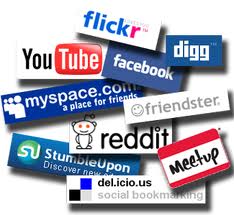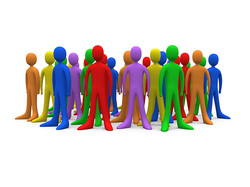Lately I have noticed a difference in manners when it comes to cell phone use. It used to be (and maybe still is) considered very rude to take a phone call in the middle of a conversation, or to be texting while eating a meal at a restaurant. It seems like now that it’s more acceptable. It’s almost like people understand because they do it, too.
Admittedly, I am known to text or check my phone during a conversation. I really try hard not to, though, because I don’t like it when others do it. While others claim to be good “multi-taskers,” I know I am not. I try to be, but I’m just not. I simply cannot pay full attention to a conversation while texting. My mind is half on the text message, and half on the conversation, which means bad news for me. Usually I’ll send the text to the wrong person, or say something that doesn’t make any sense in the conversation. I lose my train of thought on both ends, and it just ends up being rather disastrous.
In class last semester we watched a documentary on multi-tasking. A series of tests were done on a group of “good” multi-taskers, and it was discovered that they weren’t as good as they thought.
Anyway, back to the whole manners topic. I remember in college, when cell phones were first becoming popular, it was rude to even bring a cell phone to class. We were supposed to leave them in our dorm rooms, which I actually remember doing. Now, it’s considered OK to bring one to class, but they must be on silent. By the way, silent doesn’t mean vibrate. It’s rather distracting to hear someone’s phone vibrating during a test, or when the instructor is trying to lecture.
If someone takes a phone call during a conversation I’m having with them, I completely understand if it’s an important call. But, then again, how many calls are really that important that they can’t wait? “Important” calls also lead me to ask, what did you do before cell phones?
I have some random thoughts. Yeah, I know. Me, random. No way. So in the words of a previous coworker, here’s an edition of “Cleaning out my mind.”
The Academy Awards were on last night, which got me thinking about why we seem to worship celebrities. Why do we ask for their autographs and scream and stammer in their presence? They are just people, just like you and I. For some reason we’re interested in their lives. People like stories about other people. It’s weird, but I’ll admit, I’m one of them. I’m not a diehard fan of celebrity gossip, but I do occasionally like to catch up on the Jennifer/Angelina/Brad triangle, or the reasons why Jessica Simpson gained weight. I do, however, get sick of hearing about Lindsay Lohan and Paris Hilton. Why are they famous again?
I’ve been recently asked a few times if I’ll return to newspapers after I graduate. The short answer: No. The long answer: The past two years in grad school has taught me a lot about myself and what I’m interested in. I’ve realized there’s a lot more opportunities out there where I can still write that doesn’t have the daily deadline crunch, or the city hall and school board meetings. There’s a lot more out there that I can write about that I think people may actually care more about. Only about 3/4 of me liked working at a newspaper anyway. I’m not saying I regret the two years I spent working for newspapers. In fact, I’m grateful for it. It taught me a lot and gave me wonderful experience. I can honestly say I wouldn’t be where I am today if I hadn’t worked for newspapers.
I’ve previously written in this blog about news. Well, I’m bringing it up again. Maybe it’s just me because I’m getting older, or maybe it’s actually happening, but whatever the reason, it seems like news isn’t just news anymore. Ever since cable, when CNN, MSNBC and FoxNews came into the fore, it seems like news has become a compilation of opinion. My parents can remember the days when news was just that -- news. Can we have that back please?
I am currently in the process of writing a lengthy magazine article as part of my professional project to graduate. It is so much harder than I thought it would be! I never realized how different magazine and newspaper writing are. I also didn’t foresee that after writing academic research papers for nearly two years, that writing creatively would be so difficult. I’m so glad I decided to take on the task though. It’s a fun and challenging way for me to gain more experience before I head into the working world again.
The Midwest winter has definitely hit me hard this year. I have the winter blahs. Spring cannot come soon enough.
If you think about it, communication is cool. At least it's cool to me.
Think about it. Every day we communicate. Every day we sit down to watch TV, listen to the radio, chat with a friend on Facebook, tweet about snow storms, text our significant others about what to have for dinner, write a status on Facebook, nod our heads in agreement, Skype with a brother in Afghanistan, write in a blog, etc. These are all forms of communication.
If you're as lucky as I am (at least I think I'm lucky), you get to actually study communication in school. I am currently about 2 1/2 months away from earning a Master's degree in communication. Ask me then, when I still don't have a job, if I still love communication as much as I do now.
In my final digital storytelling class this semester, we are working with the Boys & Girls Club of Milwaukee to create digital stories of high schoolers who have excelled as a part of the organization. Through communication, me and my six class mates are preparing these digital stories (probably videos) so the community can see how the Boys & Girls Club has contributed to their lives. We are then communicating these videos to the public, who are then (hopefully) communicating to their friends, family, Facebook, Twitter, and so on. It's communication! The concept fascinates me. Obviously.
Communication is what's telling us about protesters as far away as Egypt, and in our neighboring city of Madison. Communication is what took place when I saw Wisconsin Gov. Scott Walker on Good Morning America this morning. Communication is what happened when almost the entire city of Milwaukee (Marquette AND MCW too!) shut down because of a snow storm. Communication occurs when I learn about that all my friends are either engaged or pregnant on Facebook. (When did I become that age?)
Communication is what happens when I get "the look" from my fiance. Even when we drive, when people use their turning signals, that's communication. Although, it seems like lately people are choosing not to use them, but that's a whole different blog entry.
Communication comes in all forms. From what we wear, to what our body languate and what we say, or don't say, is all communicating. Pretty cool, huh
OK, I think I'll stop my rant now. I clearly think communication is a pretty neat tool.
I know, I know, Skype is old news. But needless to say, it amazed me this past weekend. I was able to talk to my brother, who is in Afghanistan, at least 8,000 miles away. Across an ocean. Across miles and miles of land. Across several time zones. I was able to do this at the same time I was able to talk to my parents in Michigan. Across 60 miles of lake and about 200 miles of land. Across a time zone. All for free. You can’t tell me that’s not incredible.
While I was sitting there eating my breakfast and my brother was telling us what he just ate for dinner, there were times when the signal wasn’t so great. Sometimes the voices would freeze or we’d lose someone. I have to admit that during these times I became frustrated and asked, “Why in the heck is it doing this??” To which my fiancé replied, “Because it’s traveling across the world.” Oh yeah. Amazing how we get annoyed when things aren’t instant. The fact that it was working it all is like magic.
This was the first time I had used Skype in that way. I downloaded it only a few weeks ago when my brother left for the Middle East. I am a late adaptor to the program, which is probably why it amazes me so much.
Which brings me to my next realization. It is amazing to me how much communication has changed. If my brother was in Afghanistan five years ago, we would have been limited to e-mails. If he was there 15 years ago, we probably would have been limited to only phone calls and maybe the occasional e-mail if dial-up internet was available in the Middle East. If he had been deployed 20 or more years ago, we would have been limited to letters and maybe an occasional phone call. We’d probably just be getting a letter from him saying he safely landed. I don’t know how people did it back then. To not be able to hear someone’s voice, or to be able to see them on Skype would be so hard.
Yes, I realize Skype has been around for a while and many people have probably used it in more amazing ways than I have. But it doesn’t change the fact that technology never ceases to amaze me!
As I am approaching my final semester of graduate school, I’m realizing I must start job searching. Again. While I’m not exactly looking forward to the task, I also realize how far I have come since I first moved to Milwaukee two years ago. Almost exactly two years ago was the first time I spent more than a weekend in Milwaukee. It was also my first time in the Bradley Center, in Mayfair Mall and getting lost on my way to Marquette University’s campus. It was also my first time getting used to the idea of Marquette as a University, and not just a city in the upper peninsula of Michigan. I moved to Milwaukee only about a week after getting laid off from my job as a newspaper reporter in Adrian, Michigan. It was tough, but somehow I remained fairly upbeat. That winter and early spring, I had a few promising job interviews. After I found out I didn’t get one I was very hopeful for, I decided to look at other options. That’s when I met with the Associate Dean of Communication at Marquette and decided to attend grad school. I never thought I would go to grad school. There was no need to at the time I received my Bachelor’s degree. But needless to say, in only two years, times had changed. Now, with graduation looming over me in May, I know I must start applying for jobs again. And although the part time position I have now at the Medical College of Wisconsin may possibly turn into a full time opportunity, I know I still must look elsewhere just in case it doesn’t. But I have a lot more going for me than I did two years ago. I have may a lot more contacts, including people I work with at MCW, the faculty members I research for at Marquette, professors who have taught me, doctors I will be interviewing for my professional project this semester, etc. I have more of an online presence, including my own Web site www.mbrittany.com, another Web site, and a LinkedIn profile. I know without being in graduate school, I wouldn’t have gotten the position at MCW. And if I didn’t have work experience, I might not be researching for two faculty members at Marquette and therefore, probably wouldn’t be there. I don’t regret any of the career choices I have made; each has gotten me to where I am today and will hopefully (already getting my hopes up!) land me a fun, but challenging opportunity after I earn my Master’s degree. I hope it’s all worth it. Here’s to my final semester!
 This past week marked our last Emerging Media class and my last fall semester at Marquette University. (I graduate with a Masters degree in May, which I can't believe.) Throughout the semester, we worked on a final project of our choice. I chose to do a "personal branding" Web site in which I will use to market myself for a future job. Visit mbrittany.com to see it. Let me know what you think on here, or through the contact form on the site. I didn't exactly know what to expect when I started this class. I knew, knowing our professor, Linda Menck, who I'd had before, that it would be project-based, and that we'd have a few good guest speakers and some interesting conversation. Well, it was all that plus some. The main concept I learned during this class is to not be afraid to put yourself out there, especially on the Web. What's the worst that could happen? You get a job because of it? Oh no... While I am still a little skittish toward Twitter, I have become more willing to display myself professionally online. Especially if it means landing a job because I know how tough and discouraging finding a job can be. I've learned to find a personal "brand" and run with it. Brag about yourself if you need to and tell others what you're good at. It can't hurt in the online world, at least I don't think it can. The speaker I enjoyed the most throughout the semester was Laura Gainor. She put herself out there and she got a job. She's one of the most energetic, knowledgeable people when it comes to social media. Her passion and excitement seemed to rub off on people. It was very, very enjoyable listening to her. I do have a couple gripes about this course, however. The first is that it must have been so hard to teach a class on emerging media. Media and technology is changing so rapidly every single day it's hard to keep up with. And what exactly is emerging media anyway? I think everyone has their own definition and there's so much to cover in only one semester it's hard to get to it all. I commend Linda for even trying to teach an emerging media class.My other gripe is that although at times topics and discussions challenged me, it was rare. I have grown up with computers and the Internet most of my life so a lot of the concepts we talked about I already knew. What was challenging however, is trying to figure out a way to keep up with it all, and to try to be innovators in maybe a not-so-innovative workplace. I think to make this class more challenging (and I can't believe I'm saying this) is to add a few more assignments in to it. One might be to come up with a way to implement social media Web sites into the workplace, or to brainstorm branding slogans for our own personal brand. Or maybe to even take a concept a guest speaker talked about and make a very small micro site out of it. Something to make us think more and put what we discussed into practice a bit more. The part of class I enjoyed the most is class discussion. We had some very talented people with tons of different ideas. It was very interesting listening to different perspectives and opinions. It was also very fascinating watching and listening to all of the presentations. Everyone had a different approach and a different perspective.Despite my gripes, I am glad I enrolled in this class. Media and the way it's changing is very interesting to me and I think it always will be.
 During this past semester, our class listened to many guest speakers. At least two of these guest speakers (Laura Gainor and Tonise Paul) talked about the way they are using social media to advance their careers and ultimately change the way marketing and communication works.
Laura Gainor used Twitter to land her job at Comet Branding in Milwaukee. She used video posts and Tweets to put herself on the Web and let her company know she’s a very avid user of social media (she was applying for a social media strategist position, so it all made sense).Tonise Paul talked about the way her company, BBDO, which she is the president and CEO of, used social media as a marketing tool. She showed this video, which is about the way they promoted the Chicago Art Museum through finding "lost" red cubes around the city of Chicago. After listening to these speakers, I realized that social media is a very powerful tool. More powerful than I ever would have guessed it would be. So I decided to make it part of my final project health communication class, in which we were to create a health communication campaign. We didn’t actually create a campaign, but we were supposed to set it up as if we would. My campaign’s goal was to decrease people’s confusion about fats in food, and increase knowledge about what fats are good to eat and what fats are bad. The end goal, although a long shot, would be to change people’s eating behaviors. The program is targeted at the digital generation (teens and college students).After giving my final project presentation to my class this week, we had a discussion about how people seem to be motivated by social media challenges, especially when they might win something for it.My point is that this motivation to find a red box or increasing online presence to land a job is very fascinating to me. If I lived in Chicago and someone wanted me to find a red box, I’m not so sure I would be motivated to do so. I guess I just don’t become that enthused or excited about running around a city to try to get free tickets to a museum. Now if it were about landing a job, it might be a different story. But I’m still not sure I would want to put myself out there like Gainor did. But then again, maybe I would have to be fueled by wanting a job so badly I would do whatever it took to get it.But for whatever reason, it would take a lot for me to be motivated by the red box project. Why is that? I do not get involved in very many other games online either, and rarely find games addicting. Don’t get me wrong, I love games. I just don’t find them addicting like some people do. Maybe it’s because I’m not part of the digital generation. Maybe it’s because I’m only competitive with things I like or I am good at, such as soccer and euchre (card game).
Even though I am not motivated or competitive with social media marketing, I still think it’s fascinating and love seeing other people become motivated by it.
 Being a former journalist, I was intrigued by an article I recently read about a newspaper that will have no “print” or “web” edition. Called The Daily, the newspaper will be available on devices such as the iPad at 99 cents per week, or $52 per year, and will have news updates available three times per day. Available sometime in early 2011, the digital newspaper’s headquarters will be in New York City and it will have a staff of about 100. First of all, I have a few questions about the “inewspaper.” What will the content of the news be? Similar to USA Today it that it’s general news about the world? Who will write the articles? The newspaper’s own reporters, or will it just be articles pulled from the Associated Press wire? What format will the newspaper be in? Actual full-length articles, or news similar to a Tweet? What will be different in this newspaper versus a free one? What will make people want to purchase this newspaper? Depending on the answers to these questions, the inewspaper is something I would definitely consider purchasing. Overall, I think an inewspaper is exactly what is needed in the journalism world. I think it’s what’s next in terms of news, and I think in the next decade or so more newspapers will be (or should be) adapting something similar. However, I wonder if people will purchase this newspaper, especially when they can get news for free from their local newspaper’s Web site, or from Web sites such as CNN or FoxNews? For example, right now I receive all my news online. I go to the Milwaukee Journal Sentinel’s Web site a few times per week, and also two local newspaper’s Web sites in my hometown. I’m also known to go to a few different national news Web sites a few times per week. I receive all of my news for free, so why would I pay for something extra? I would need a pretty good reason. On the other hand, maybe it’s just me. Maybe I’m one of the few that wouldn’t pay for an inewspaper. Maybe I will find a reason to pay once I have a stable job and am not a graduate student on a budget. Another point I want to make is that it’s hard for me to think about a demographic that might be attracted to the inewspaper. On one hand, it might be college students or young working professionals because of the digital attraction. But on the other hand, I’m not sure I can see this demographic paying for a newspaper. I can see the older generation paying for it, but I can’t see many of them being that digitally savvy. Needless to say, The Daily has certainly peaked my interest and I’m curious to see how it will pan out. To read the articles that sparked this blog, visit here or here.
 I recently saw this quote (the title of this post), by Daniel Patrick Moynihan, in a column written by Ted Koppel in the Washington Post. For those who don’t know, Moynihan was a New York senator under President Kennedy’s administration, all the way up to President Ford. I was drawn to Koppel’s column because it was about something that has been bothering me for a while. The “news” doesn’t seem like “news” anymore. In fact, I honestly don’t even remember when news was just the facts. It seems like most news I hear, read, or listen to, has some sort of bias, even if it’s not apparent up front. I’ve read articles about the same topic on FoxNew’s Web site, then on CNN’s Web site. They’re essentially about the same topic, but written from very different angles. I remember doing this around the time of the Gulf oil spill last spring. FoxNews’ article focused on how the Obama administration wasn’t doing enough, and how often Obama himself was on vacation. CNN’s article focused on Obama’s trips down to the Gulf and how he was helping out. It’s not that either of the articles is reporting false information. But stories are probably reporting facts, but it’s interesting to note how each chose to focus on different “facts,” thus representing their own bias. I had a conversation with my parents about “news” a while ago. They said when they were growing up (in the 60s and 70s) that news was news. They watched the nightly news on one of the three channels they got and that was it. Then cable came along and news somehow changed. Now we have two main polarized cable “news” channels – FoxNews and CNN, which tend to lean conservative and liberal, respectively. Of course, each claims to be an unbiased news source. And to some extent, they are. They both report facts – it’s just the way they report them that makes them different. However, shows such as Bill O’Reilly, Glenn Beck and Keith Olbermann, aren’t “news.” But I think some viewers take it as news. I’m not normally a huge Koppel fan, but he makes some good points in his column – that news stations tell viewers what they want to hear to reinforce his or her political beliefs, and that although news can be bias, true objectivity is pretty much impossible to accomplish. One of the things I remember learning while majoring in journalism at Western Michigan University in undergrad, was exactly that; that no matter how hard you try, you simply cannot be totally unbiased. Even a certain quote a reporter chooses to use – if he or she uses one over another – is bias. The way a reporter chooses to angle a story, focusing on one aspect instead of another, is bias. It’s might not be politically bias, but it’s still bias. I don’t think it’s just FoxNews and CNN, however. I think the general news, whether it is a local newspaper, TV station, or the AP wire, has its own bias. That doesn’t mean the bias is necessarily political though. As I said before, I don’t think anything is truly unbiased, no matter what the topic. As things change, and as news is portrayed on cable channels and on the internet, I think people must become better, more thoughtful consumers. We can’t just read, listen to or watch a news story and instantly believe everything it has to say. We must critically think about “facts” in the news and why a story is angled a certain way. Wouldn’t it be nice if everyone realized this and questioned stories in the news more often? Or, on second thought, shouldn’t “news” be “news” so people don’t have to question a stories’ truthfulness? If you’re interested, you can read Koppel’s column here.
 Browsing through Mashable.com today, one main story caught my eye. It was a story about a new social networking site called Path. Spawned from the idea of Twitter, Path allows users to make random updates and see what others’ updates are as well. What makes Path different from Twitter, however, is that it only allows users to have a maximum of 50 friends. Path’s “thing” is to have a more intimate social networking site so users don’t have to worry about what they share because only their closest friends will see it. Path also claims to be focused on “intimate photo sharing.” When users update Path, they must share their photos with three things to give them context: a person, place and thing. Being a photo person and a person with only a few close friends, I can see how this sight might catch on. One thing I’ve always disliked about Facebook and Twitter is that, especially with the younger crowd, it seems to be a popularity contest of who has the most friends and whose wall gets written on the most. Photos give a social networking site more of a personal touch, and more of an “intimate” feeling – which is exactly what Path is going for. It would be nice to, say, go on a trip, take a photo and have only a select few people see it. I think sometimes on Facebook, not everyone cares to see your new haircut or pictures of how big your belly has gotten in your final trimester. But, close friends and family probably do. Path would be perfect for that. I think Path might attract an older demographic – those who have 50 or fewer friends on Facebook and only care to use it to keep in touch with family and close friends. However, I’m pretty sure the point to Path is similar to Twitter; more of an instant gratification thing, done more on a smart phone than on a computer. I just can’t picture my parents carrying around a smart phone, taking pictures of random things and sharing it. I also don’t know if they would have the motivation to do that or learn how. I can see my parents maybe uploading a picture or two a week – not per day, which is usually how many times people Tweet. But then again, maybe Path won’t be used like Twitter; why would it have to be? I’m not sure Path would work for people who feel like they have to have 100 friends to feel OK about themselves. Many people would hear they would be limited to only 50 friends and not even bother to try it. I really think 50 friends is enough. Who actually knows every single Facebook friend they have; especially those with more than 500 friends? Overall, I think Path is a good idea. I think it may help create a more intimate feel for a social networking site. I don’t think it will ever be as popular as Facebook or Twitter, but why does it have to be? To see the Mashup article on Path, click here.
|





 RSS Feed
RSS Feed